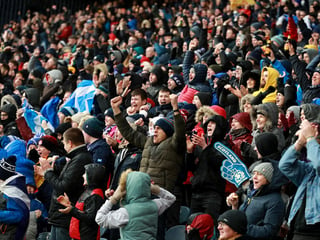Allan Massie: Watching sport on TV has been therapeutic, surely helping many to ward off depression


England arrived for the second round somewhat humbled, having lost to the sparkling young French team in Paris. That game ended with Owen Farrell kicking a penalty goal to secure a losing bonus point. The Calcutta Cup was played the following week in the vilest conditions: a near gale-force wind, heavy showers and bitterly cold on the sort of evening that once led Robert Louis Stevenson to speak of Edinburgh’s “penitential” weather. Both teams needed a win, Scotland having lost a match in Dublin they had good chances to win.
In the event England won 13-6 because, attempting almost nothing in the way of handling, they managed the conditions better than Scotland and took what was almost the only chance they had to score a try. So they were still in the title race, if only clinging on by frozen fingertips, and Scotland were out of it.
Advertisement
Hide AdAdvertisement
Hide AdFrance came to Murrayfield in March in what would prove to be the last international in the northern hemisphere this year to be played in a stadium full of fans. Scotland, having just defeated Italy in a scrappy match, now gave their best performance of the season and ended the French hopes of a Grand Slam. When the tournament resumed in the autumn Scotland won in Wales for the first time in too long, though in Llanelli rather than Cardiff, thus finishing with three wins. France and England finished level on match points, but England won the title thanks to a superior points for-and -against differential – or, if you prefer, thanks to Farrell’s decision to settle for that losing bonus point in Paris.
So ended the strangest of Six Nations tournaments. For Scotland it was a modestly successful one, surprisingly successful in view of the fact that a breach of squad protocol – a somewhat minor piece of indiscipline – led to a fall out between Gregor Townsend and Finn Russell which meant that he didn’t return to the team till the Welsh match in the autumn – a game in which both he and his understudy Adam Hastings were injured. It was a poor game played in a howling wind, but a very satisfying result.
In a year dominated by the Covid-19 pandemic we can count ourselves fortunate to have had any rugby – indeed any professional sport – in the autumn and winter months. Some, viewing restrictions imposed on so many businesses, may be critical of the Government’s decision to permit professional sport, even with the proviso that spectators were banned. Yet, given the recognition of the damage done by the lockdown to many people’s mental health, it seems certain that the opportunity to watch rugby, football, cricket, racing and other sports on TV has been therapeutic, cheering us up and surely helping many to ward off depression and other sorts of mental problems.
So the year ends with us able to look forward with a measure of optimism to the Six Nations even if the first match takes us to Twickenham. Given that no one in the Scottish playing squad was alive, and Gregor Townsend himself was a few weeks short of his tenth birthday, when we last won there in 1983, and that indeed we have won only four times at Twickenham since the ground was opened before the First World War, the odds are somewhat against victory, though there have of course been draws and some very narrow defeats, the last draw being that extraordinary 38-38 match only two years ago.
Still, if 2020 has been a qualified success for the national team, in other respects this has been a disappointing year for our two professional clubs. Glasgow seem in steep decline, Edinburgh tiresomely inconsistent. Moreover we are, with a shrug of drooping shoulders, reconciling ourselves to the probability that both clubs will see more of their best players following the example of Russell, Stuart Hogg, Jonny Gray and now Hastings heading across the border to England or the sea to France. The Scotland team may not suffer from such departures and may even be improved. Other consequences require attention in the future.
Meanwhile, casting one’s eye over the year that is mercifully about to expire, one can at least find some satisfaction in the development of a Scotland pack that appears more capable of holding its own against Six Nations rivals than has been the case for some time.
Finally two notes on referees. It has been too long since a Scottish referee took charge of a Six Nations match, an extraordinarily long time when one thinks of the reputation once deservedly earned by outstanding Scottish referees such as Jim Fleming, Brian Anderson and Alan Hosie, but at last Mike Adamson is following in their footsteps. He does so even as Nigel Owens, the Welshman recognised as the doyen of modern referees has retired from international whistling. He deserves more notice than I can give him this week; matter for another time.
A message from the Editor:
Thank you for reading this article. We're more reliant on your support than ever as the shift in consumer habits brought about by coronavirus impacts our advertisers.
If you haven't already, please consider supporting our trusted, fact-checked journalism by taking out a digital subscription.
Comments
Want to join the conversation? Please or to comment on this article.
